“Where should I host my podcast?” We get this question a lot from aspiring podcasters. And we get it – with so many options out there, it’s hard to know which platform will give you the best bang for your buck.
We remember feeling the same confusion when we started podcasting. But after years of running our own shows and helping others launch theirs, we’ve learned exactly what features matter most for different types of podcasters.
To save you time and potential headaches, we’ve thoroughly tested the most popular podcast hosting platforms available today. From free options perfect for beginners to premium services for professional podcasters, we’ve narrowed it down to these 7 best choices.
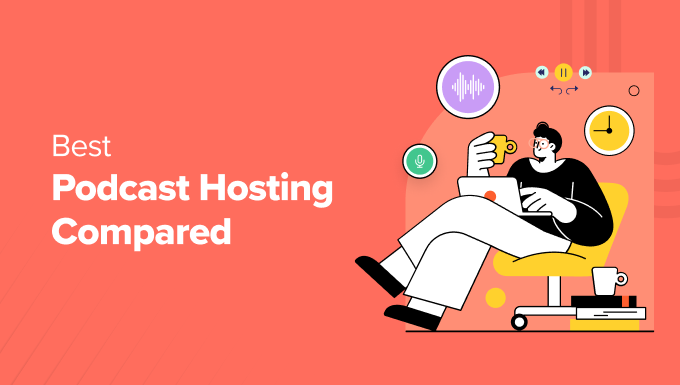
Quick Pick ⚡: The Best Podcast Hosting Platforms
Are you in a hurry? Here’s a quick breakdown of the podcast hosting services you can choose today.
| # | Podcast Hosting Service | Best For | Pricing |
| 🥇 | PodBean | Complete podcast hosting solution | Freemium Pro starts from $9/month |
| 🥈 | Buzzsprout | Beginner-friendly platform | Freemium Pro starts from $12/month for 3 hours of upload each month |
| 🥉 | Blubrry | Manage podcasts using a plugin | Starts from $12/month |
| 4 | Transistor | Feature-rich podcast hosting | Starts from $19/month for up to 20,000 downloads/month |
| 5 | Fusebox | Stunning web media player | Starts from $7.50/month |
| 6 | Libsyn | Easily publish and promote podcasts | Starts from $7/month with 3 hours of new uploads/month |
| 7 | SoundCloud | Embed podcasts in WordPress | Freemium Pro starts from $99/year |
What Is Podcast Hosting?
Podcast hosting is a specialized service that offers to store and deliver media files associated with a podcast.
Just like you need a website hosting service to store all your website files, podcast hosting offers the same service but for your podcast’s media files.
Now, you may be wondering whether you could just use your website hosting to store your podcast files as well.
You can do that, but that wouldn’t be good for your website or your listeners.
Why Do You Need Podcast Hosting?
You see, podcast episodes are large files. If you deliver them from the same server as your website, it can eat up server resources.
Consequently, it makes it harder to maintain fast, reliable performance — especially during traffic spikes. In some cases, it could even cause your site to crash.
If several users start downloading at the same time, then most shared hosting services will simply block the processes that are taking up server resources. This means users will not be able to download your podcast.
And that’s precisely why you need a podcast hosting service.
These companies specialize in storing and delivering large media files. They are made specifically for podcasters and have specialized tools to handle this use case.
You also get support from folks who are specialists in the industry. This makes a huge difference in the long run.
How We Test and Review Podcasting Hosting
To ensure we provide our readers with the most accurate and helpful information, we use a strict testing and review process for all the podcast hosting platforms featured on our site.
Our tests are based on a comprehensive set of criteria that directly address the needs and expectations of podcasters:
- Ease of Use: We assess how easy the platform is for both new and experienced podcasters. This includes the onboarding process, interface design, and overall user experience.
- Audio Quality: We evaluate the quality of the audio produced by the platform, considering factors like bitrate, compression, and overall clarity. As a podcaster, it is important that the platform provides exceptional audio quality.
- Features: We assess the range of features offered, including episode scheduling, analytics, monetization options, and integrations with other tools and plugins. Plus, we looked at distribution options so you can easily publish your podcast on multiple platforms.
- Reliability: We test the platform’s uptime and reliability, ensuring that podcasts are consistently available to listeners.
- Customer Support: We evaluate the quality and responsiveness of the platform’s customer support, checking how well they address user inquiries and resolve issues.
- Pricing: We compare pricing plans and value offerings to determine which platforms offer the best value for the money.
Why Trust WPBeginner?
At WPBeginner, we have over 16 years of experience in WordPress, podcasting, SEO, content marketing, and email marketing.
We don’t just write about podcast hosting — we actively use it.
Our team tested each platform hands-on, evaluating real-world performance, features, pricing, and ease of use. Every recommendation in this guide is based on actual experience, not paid placements.
Our team of experts tested each podcasting service thoroughly and shared the results with our readers. To learn more, please see our complete editorial process.
That being said, let’s take a look at the best podcast hosting services that you can use.
1. PodBean

PodBean is our top pick for the best all-in-one podcast hosting platform. It offers unlimited storage, unmetered bandwidth, and powerful distribution tools, making it a great fit whether you’re launching your first show or managing multiple episodes per week.
We signed up for a test account while writing this guide, and we were genuinely impressed by how easy it was to get started. From publishing to monetization, PodBean provides everything you need to grow your podcast under one roof.
The hosting service includes beautiful design tools to host your website with customizable themes. You can also easily embed the PodBean podcast player directly into your WordPress posts and pages.
Aside from that, we also liked that they have podcast promotion tools that automatically submit your episodes to all top podcast directories, like Spotify and Apple Podcasts. This allows your audience to use their preferred tools to listen to and download podcasts.
PodBean offers an advertising marketplace that provides opportunities for podcasters to monetize their content. They also have a huge community of podcasters already using PodBean as their podcasting platform.
Pros of PodBean:
- Unlimited audio and video hosting
- Beginner-friendly interface
- Schedule podcast publishing
- Easily distribute podcasts to popular platforms
- View real-time statistics of podcast performance
- Live streaming, live calls, and instant messages
Cons of PodBean:
- The free version only allows 5 hours of storage
- Email marketing integration is limited to Mailchimp
Why We Recommend PodBean: It is one of the best podcast hosting services that offers unlimited video and audio hosting at affordable prices. We recommend PodBean because it offers powerful features for promotion, tracking performance, monetization, and boosting engagement.
Pricing: Free plan with limited storage. Paid plans start from $9/month with unlimited storage.
2. Buzzsprout
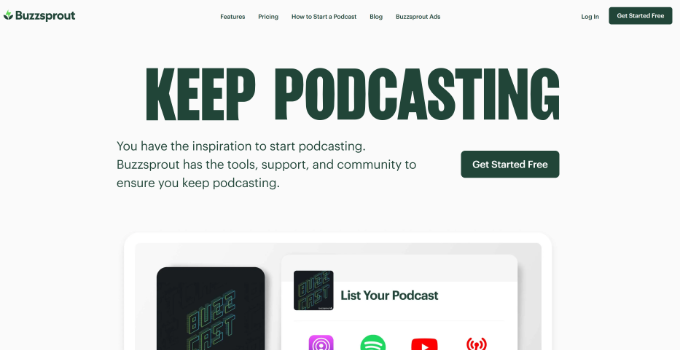
Buzzsprout is the best podcast hosting platform for beginners. Whether you want to publish weekly interviews or a passion project, it removes the technical barriers and helps you focus on creating great content.
The podcasting host has been around since 2009 and has built a thriving community that includes some of today’s top podcasters. At WPBeginner, we’ve used Buzzsprout in the past for our own podcast, and we’ve seen how it offers fantastic features and benefits.
If you are just getting started, then you will find the service incredibly easy to use. Just upload your media file, and Buzzsprout automatically takes care of the rest.
They will also automatically submit your episodes to all the top podcast directories, which ensures that your podcast is available on all devices and apps.
The best feature we found was that their embeddable podcast player works well on all screen sizes. It shows the cover art, social sharing buttons, forward and backward skip controls, and more.
They also offer a free WordPress plugin that makes embeds even easier. If you don’t want to make a website, then Buzzsprout can make one for you. You can customize its design and use your own custom domain name.
Pros of Buzzsprout:
- Super easy to use
- Supports all top podcast directories
- Detailed reports and stats for podcast performance
- Dedicated WordPress plugin to embed podcasts
Cons of Buzzsprout:
- Paid plans have bandwidth and upload limits
Why We Recommend Buzzsprout: After testing different podcast hosting services, Buzzsprout is the most beginner-friendly and easy to use. Simply upload your media file, and the platform will take care of the rest.
Pricing: Limited free plan hosts each episode for 90 days, up to 2 hours each month. Paid plans start at $12/month for 3 hours of upload each month.
3. Blubrry
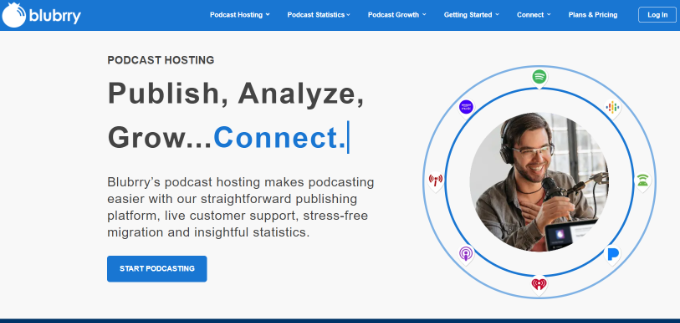
Blubrry is the best podcast hosting service if you want to manage everything directly from your WordPress site. Its powerful PowerPress plugin lets you publish, control, and optimize your podcast episodes without ever leaving your WordPress dashboard.
The best feature we found when testing the service is that using Blubrry with PowerPress makes it easy to upload your podcast episodes directly to your podcast hosting provider.
It also allows you to easily submit your podcast to Apple Podcasts (previously iTunes) and Google Podcasts.
This makes your podcasts easily discoverable on Google Home, Assistant, and Google Podcast app on Android devices.
Blubrry also offers monetization options, podcast statistics, social sharing features, and more.
Pros of Blubrry:
- Offers a dedicated WordPress podcast plugin
- Create a free WordPress site for your podcast
- Limit podcast access to authenticated users
- Podcast analytics reports
Cons of Blubrry:
- There is no free plan
- Limits on storage on premium plans
Why We Recommend Blubrry: We recommend Blubrry because of the WordPress plugin (PowerPress) it offers. The plugin makes it very easy to manage your podcast directly from your WordPress website.
Pricing: Starting from $12 per month with 125 MB of storage each month.
4. Transistor
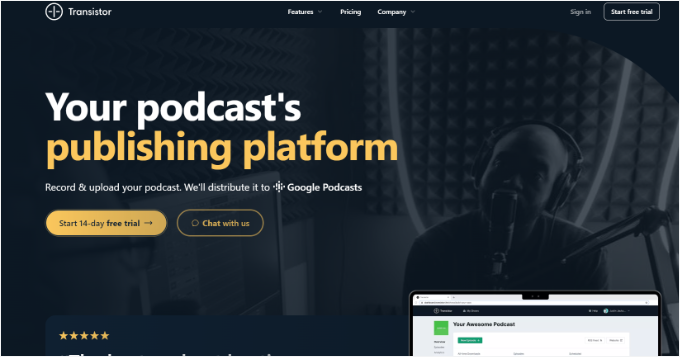
Transistor is a powerful podcast hosting platform packed with advanced features for creators who want to grow and scale. From detailed analytics to multi-user access and private podcasting, it’s designed with both solo podcasters and teams in mind.
Unlike many other hosts, Transistor gives you unlimited podcast hosting, so you’re not restricted by hours or episode limits.
But what impressed us the most was how easy it is to upload your podcast media files and publish them. They also offer podcast analytics so you can see how each episode performs.
Their embed code allows you to easily add each episode to your WordPress posts and pages. If you don’t have a website, then they can quickly create one for you.
One thing to watch out for is that their plans limit the number of downloads. This means you need to upgrade your plan as your podcast grows.
Pros of Transistor:
- Unlimited podcast storage and bandwidth
- Unlimited team members and collaborators
- Get dynamic ads for promotion
- Automatically post to YouTube
- Get a built-in podcast website
- Advanced analytics for podcast performance
Cons of Transistor:
- No free plan
- The premium plans are slightly expensive
Why We Recommend Transistor: What makes Transistor a great podcast hosting platform is that it has no limits. Plus, you get a lot of features like a built-in podcast website, dynamic ads, integrations, and more.
Pricing: Starting from $19 per month for up to 20,000 downloads each month.
5. Fusebox (Formerly Smart Podcast Player)
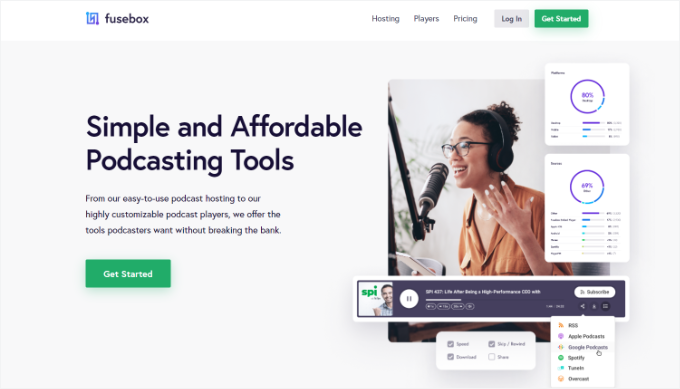
Fusebox stands out with one of the most beautifully designed and customizable podcast players on the market. If your goal is to create a podcast experience that looks as good as it sounds, Fusebox gives you the tools to do just that.
Built by podcasters for podcasters, Fusebox delivers a stunning, responsive media player that’s optimized for engagement. With unlimited episode uploads and easy hosting, it’s perfect for creators who want their podcast to blend seamlessly with their site’s design.
Our testing showed that Fusebox allows you to display a beautiful media player on your website. You can show it on individual episode pages for your podcast or on your homepage. Users can browse the episodes, use on-screen controls, share the podcasts, and more.
The player looks beautiful on all devices and screen sizes. You can also customize its colors to match your website and make it sticky on top or bottom.
Apart from helping you find new listeners, Fusebox also helps you grow your email list and increase return visitors to your website. This tool is used by every top podcaster in the world, and it was created by Pat Flynn’s team.
With Fusebox hosting, you get essential analytics to track the performance of your podcast. Plus, it offers hassle-free migration from other platforms.
Pros of Fusebox:
- Beautiful media player
- Unlimited episode uploads
- Essential analytics to track performance
- Create and edit transcripts
- Simple migration to Fusebox
Cons of Fusebox:
- No built-in WordPress website for the podcast
- Doesn’t offer a free version
- Limited integration options
Why We Recommend Fusebox: We recommend Fusebox because of the media player it offers. Along with podcast hosting, you will get a stunning web player that offers lots of features.
Pricing: Starting from $7.50 per month (billed annually)
6. Libsyn

Libsyn is a beginner-friendly platform that makes it easy to launch, distribute, and monetize your podcast — all while keeping your branding front and center.
\With powerful syndication tools, you can automatically publish to Apple Podcasts, Spotify, YouTube, and dozens of other apps and platforms with just a few clicks.
Libsyn started in 2004, which makes it one of the very first podcast hosting service providers. The platform was created by podcasters for other podcasters and has a large community of users, including some of the most influential creators.
They offer three podcast hosting plans with different monthly storage limits but with unlimited bandwidth.
Pros of Libsyn:
- Easy-to-use podcast hosting platform
- Publish your podcast to popular platforms
- Monetize podcasts with ads and donations
- Podcast analytics and reports
Cons of Libsyn:
- No free trial or free version
- Advanced stats cost extra money
- Limits on storage and uploads
Why We Recommend Libsyn: What makes Libsyn so great is that it lets you create a podcast in no time. It offers a simple and user-friendly interface along with other features for publishing and promoting the podcast.
Pricing: Starting from $7 per month with 3 hours of new uploads per month and 162 MB monthly storage.
7. SoundCloud

SoundCloud is a well-known audio platform that doubles as a solid podcast hosting option, especially for creators who want to keep things simple.
One standout feature is how easy it is to share and embed your episodes directly into WordPress just by pasting the URL — no plugin or shortcode needed. This makes SoundCloud a convenient option for musicians, independent podcasters, and anyone who wants to publish audio content without technical hassle.
SoundCloud is free for up to 3 hours of uploads. Their free plan is a good starting point for beginners who want to test the waters first.
Their paid plans come with more storage, bandwidth, advanced statistics, monetization, and distribution options. SoundCloud is easy to use, but it is not the most flexible or customizable podcast hosting plan.
Pros of SoundCloud:
- Free plan offers up to 3 hours of uploads
- Easily embed a SoundCloud podcast into WordPress
- Share private tracks with collaborators
- Supports popular distribution platforms in the pro version
Cons of SoundCloud:
- Pro version can be expensive for new podcasters
Why We Recommend SoundCloud: We recommend SoundCloud to users who want to embed episodes into their WordPress pages and posts.
Pricing: Free plan with 3 hours of uploads per month. Paid plans start from $99 per year.
Which Is the Best Podcast Hosting Service?
As you can see, many podcast hosting services offer similar plans with all the essential features. However, some put limits on storage space, and some limit downloads.
Considering these factors, we recommend PodBean as the overall best podcast hosting service. Their plans come with unlimited storage and bandwidth with an incredibly easy-to-use platform. They also allow you to easily promote your podcast across different services.
Our second recommendation is Buzzsprout. It is one of the easiest podcast hosting solutions, perfect for beginners to get started.
Bonus Tip: How to Start a Podcast 🌱
Apart from a podcast hosting service, you will also need a website. This will be your podcast’s home on the internet, where you will promote it and help users discover more content.
To make a website, you will need a domain name and a website hosting account.
The domain name will typically cost you $14.99 per year, and website hosting plans start from $7.99 per month, usually paid annually.
Since you are just starting out, you will want to save money whenever you can.
Luckily, our friends at Bluehost are offering WPBeginner users a free domain and a generous discount on hosting.
For complete step-by-step instructions, see our guide on how to make a website.
Next, you will need to set up your podcast. We have created a step-by-step guide to starting a podcast for beginners. It will walk you through the complete setup, including how to record your podcasts.
What Equipment Do You Need for Podcasting?
Many professional podcasters use a variety of equipment to record podcasts. This includes microphones, an audio interface, a mixer, a windscreen, shock mounts, and more.
All of this equipment costs a lot of money.
However, you don’t need all of them just to record a Podcast. The only equipment we recommend buying from the start is a good microphone.
We recommend using Rode Podcaster, which you can plug into your computer using a USB port.
If you can spare a little more money, then you can purchase the Rode Podcaster Kit, which comes with a boom arm and a shock mount.
Once your podcast grows and you are making money from it, then you can invest in improving your setup. But remember, you can’t improve something if you don’t start it, so just start!
🌟 Alternative: Samson C01UCW is a good entry-level microphone to record podcasts. You might also want to check out the Hollyland Lark M1. It’s a compact, budget-friendly wireless microphone that delivers clear, professional audio for course creators, with built-in noise reduction.
How to Promote Your Podcast
Many of the podcast hosting services mentioned above allow you to automatically submit your podcast to different podcast directories and search engines.
You can also manually submit your podcast. Once approved, your podcast and all its episodes will become discoverable on these platforms.
Your podcast is published as an RSS feed. You will need to copy the podcast feed URL provided by your podcast hosting service.
How to Submit Your Podcast to iTunes or Apple Podcasts
iTunes is the world’s largest podcast directory, allowing users to subscribe to podcasts using their iPhones, Apple computers, iPods, and other Apple devices.
First, you will need to sign in to the iTunes Connect website using your Apple ID. If you don’t have one, then you sign up to create one for free.
Once logged in, click on the ‘Podcasts Connect’ button.
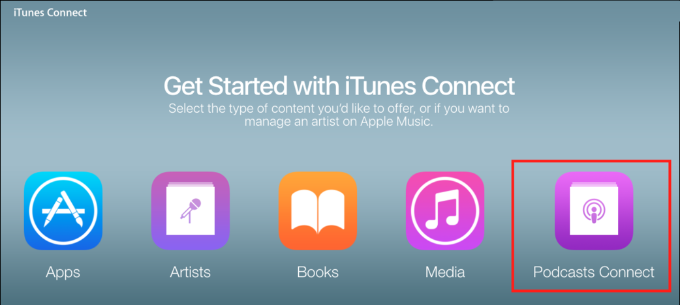
On the next screen, you need to enter your podcast feed URL and click on the ‘Validate’ button.
iTunes will now fetch your podcast information.
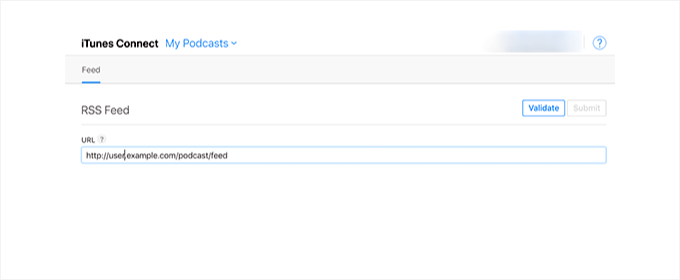
You can then click the ‘Submit’ button to continue.
iTunes will now review your podcast submission, and you’ll be notified via email once it is approved.
How to Promote Your Podcast on Your Own Website
Having a WordPress website for your podcast gives you a ton of options to promote your podcast.
First, we recommend you follow our WordPress SEO guide to make sure that your podcast website is getting search traffic.
Now, as people start visiting your website, you will notice that most of them just leave without subscribing to your podcast. This is where email marketing comes in.
You need to start an email newsletter that allows users to subscribe to your podcast via email.
Many beginner podcasters find a ton of new listeners and subscribers by running a giveaway contest. We recommend using RafflePress, which is the best WordPress giveaway plugin. It allows you to create viral giveaway contests that help you quickly get more visitors to your website.
For more tips, see our guide on how to increase website traffic.
We hope this article helped you find the best podcast hosting service to launch your podcast. You may also want to see our complete list of podcasting statistics or our expert pick of the best WordPress themes for podcasters.
If you liked this article, then please subscribe to our YouTube Channel for WordPress video tutorials. You can also find us on Twitter and Facebook.





WPBeginner Support
Thank you for sharing this drawback of theirs!
Admin
Marc
I’m surprised Castos isn’t on this list, as Seriously Simple Podcasting is a major player in the podcasting landscape and if i remember correctly also recommended by WPbeginner at several occasions. What’s the reason for excluding Castos?
WPBeginner Support
The hosts we recommend change over time as we find hosts we prefer, these are our current recommendations
Admin
Jiří Vaněk
Podcasts are currently at the top in the Czech Republic. There have been many new ones created here in the past year and it’s a fairly “new” and great way to create content. Did you leave Youtube off this list on purpose? Because youtube is also a great platform for podcasts. It offers the possibility to record podcasts, to be seen together with a guest, and at the same time it also offers a great way of monetization. In addition, embedding a YouTube video on WordPress is really very simple, and using member press and setting the video to private, the podcast can also be put behind a certain form of paywall.
Moinuddin Waheed
This is very helpful tutorial for me as I am planning to have a regular podcast in the new year.
I was planning to have a podcast a week on YouTube.
I don’t know whether starting out on YouTube is a good idea or starting on websites with these plugins would be a nice choice or blend of the two?
it would be nice if you can share which would be better for me?
WPBeginner Support
If you are just getting started then we would recommend going with the cheaper option while you are testing and once you plan on committing to a podcast long term you could look to use one of these hosting providers.
Admin
Jiří Vaněk
From my point of view, youtube is a good place to start. It’s another channel that can drive users to your website. Plus, if you’re successful, you can even monetize your podcasts with YouTube. You can then insert links to additional material on your website in the video description. So for me, YouTube only has positives.
Carla Ramos
We are just beginners as podcasters. Thanks for this information
WPBeginner Support
Glad you found our list helpful
Admin
Pamela McAllister
Thanks, helped me choose. I’m now happily using Buzzsprout.
WPBeginner Support
Glad our list was helpful
Admin
Aulpiny
Amazing article as always. Thanks for sharing an article like this. Please keep it up.
WPBeginner Support
Glad you like our articles
Admin
Bakari
Very useful article. Also curious, what application for Mac users do you recommend for editing and producing recorded audio podcasts. I want to do a co-hosted podcast, so I assume we’d use maybe Skype for the recording. But i’m not sure sure what Mac application I would use for the editing.
WPBeginner Support
For this question, you would want to take a look at our guide here: https://www.wpbeginner.com/wp-tutorials/step-by-step-guide-how-to-start-a-podcast-with-wordpress/
Admin